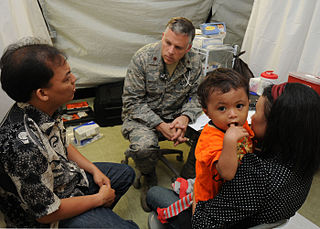Related Research Articles
Psychotherapy is the use of psychological methods, particularly when based on regular personal interaction, to help a person change behavior, increase happiness, and overcome problems. Psychotherapy aims to improve an individual's well-being and mental health, to resolve or mitigate troublesome behaviors, beliefs, compulsions, thoughts, or emotions, and to improve relationships and social skills. Numerous types of psychotherapy have been designed either for individual adults, families, or children and adolescents. Certain types of psychotherapy are considered evidence-based for treating some diagnosed mental disorders; other types have been criticized as pseudoscience.
Occupational therapists (OTs) are health care professionals specializing in occupational therapy and occupational science. OTs and occupational therapy assistants (OTAs) use scientific bases and a holistic perspective to promote a person's ability to fulfill their daily routines and roles. OTs have training in the physical, psychological, and social aspects of human functioning deriving from an education grounded in anatomical and physiological concepts, and psychological perspectives. They enable individuals across the lifespan by optimizing their abilities to perform activities that are meaningful to them ("occupations"). Human occupations include activities of daily living, work/vocation, play, education, leisure, rest and sleep, and social participation.

Informed consent is a principle in medical ethics, medical law and media studies, that a patient must have sufficient information and understanding before making decisions about their medical care. Pertinent information may include risks and benefits of treatments, alternative treatments, the patient's role in treatment, and their right to refuse treatment. In most systems, healthcare providers have a legal and ethical responsibility to ensure that a patient's consent is informed. This principle applies more broadly than healthcare intervention, for example to conduct research and to disclose a person's medical information.
Bioethics is both a field of study and professional practice, interested in ethical issues related to health, including those emerging from advances in biology, medicine, and technologies. It proposes the discussion about moral discernment in society and it is often related to medical policy and practice, but also to broader questions as environment, well-being and public health. Bioethics is concerned with the ethical questions that arise in the relationships among life sciences, biotechnology, medicine, politics, law, theology and philosophy. It includes the study of values relating to primary care, other branches of medicine, ethical education in science, animal, and environmental ethics, and public health.

Health care, or healthcare, is the improvement of health via the prevention, diagnosis, treatment, amelioration or cure of disease, illness, injury, and other physical and mental impairments in people. Health care is delivered by health professionals and allied health fields. Medicine, dentistry, pharmacy, midwifery, nursing, optometry, audiology, psychology, occupational therapy, physical therapy, athletic training, and other health professions all constitute health care. The term includes work done in providing primary care, secondary care, tertiary care, and public health.
Palliative care is an interdisciplinary medical caregiving approach aimed at optimizing quality of life and mitigating suffering among people with serious, complex, and often terminal illnesses. Within the published literature, many definitions of palliative care exist. The World Health Organization (WHO) describes palliative care as "an approach that improves the quality of life of patients and their families facing the problems associated with life-threatening illness, through the prevention and relief of suffering by means of early identification and impeccable assessment and treatment of pain, illnesses including other problems whether physical, psychosocial, and spiritual". In the past, palliative care was a disease specific approach, but today the WHO takes a broader patient-centered approach that suggests that the principles of palliative care should be applied as early as possible to any chronic and ultimately fatal illness. This shift was important because if a disease-oriented approach is followed, the needs and preferences of the patient are not fully met and aspects of care, such as pain, quality of life, and social support, as well as spiritual and emotional needs, fail to be addressed. Rather, a patient-centered model prioritizes relief of suffering and tailors care to increase the quality of life for terminally ill patients.

The healthcare industry is an aggregation and integration of sectors within the economic system that provides goods and services to treat patients with curative, preventive, rehabilitative, and palliative care. It encompasses the creation and commercialization of products and services conducive to the preservation and restoration of well-being. The contemporary healthcare sector comprises three fundamental facets, namely services, products, and finance. It can be further subdivided into numerous sectors and categories and relies on interdisciplinary teams of highly skilled professionals and paraprofessionals to address the healthcare requirements of both individuals and communities.
David Southall is a retired British paediatrician who specialised in international maternal and child hospital healthcare and in child protection. He worked in Bosnia and Herzegovina in 1993-1995, for which he received an OBE in 1999. In 1995 he set up the charity Maternal and Childhealth Advocacy International (MCAI), of which he remains a trustee as of 2023. His child protection work and research into Munchausen syndrome by proxy attracted controversy and led to conflict with the General Medical Council.
Community health refers to non-treatment based health services that are delivered outside hospitals and clinics. Community health is a subset of public health that is taught to and practiced by clinicians as part of their normal duties. Community health volunteers and community health workers work with primary care providers to facilitate entry into, exit from and utilization of the formal health system by community members as well as providing supplementary services such as support groups or wellness events that are not offered by medical institutions.
Behavioral medicine is concerned with the integration of knowledge in the biological, behavioral, psychological, and social sciences relevant to health and illness. These sciences include epidemiology, anthropology, sociology, psychology, physiology, pharmacology, nutrition, neuroanatomy, endocrinology, and immunology. The term is often used interchangeably, but incorrectly, with health psychology. The practice of behavioral medicine encompasses health psychology, but also includes applied psychophysiological therapies such as biofeedback, hypnosis, and bio-behavioral therapy of physical disorders, aspects of occupational therapy, rehabilitation medicine, and physiatry, as well as preventive medicine. In contrast, health psychology represents a stronger emphasis specifically on psychology's role in both behavioral medicine and behavioral health.
A mental health professional is a health care practitioner or social and human services provider who offers services for the purpose of improving an individual's mental health or to treat mental disorders. This broad category was developed as a name for community personnel who worked in the new community mental health agencies begun in the 1970s to assist individuals moving from state hospitals, to prevent admissions, and to provide support in homes, jobs, education, and community. These individuals were the forefront brigade to develop the community programs, which today may be referred to by names such as supported housing, psychiatric rehabilitation, supported or transitional employment, sheltered workshops, supported education, daily living skills, affirmative industries, dual diagnosis treatment, individual and family psychoeducation, adult day care, foster care, family services and mental health counseling.

A therapy or medical treatment is the attempted remediation of a health problem, usually following a medical diagnosis. Both words, treatment and therapy, are often abbreviated tx, Tx, or Tx.
Services for mental health disorders provide treatment, support, or advocacy to people who have psychiatric illnesses. These may include medical, behavioral, social, and legal services.
Family-centered care or Relationship-Centered Care is one of four approaches that provides an expanded view of how to work with children and families. Family-centered service is made up of a set of values, attitudes, and approaches to services for children with special needs and their families. In some family-centered settings such as the Hasbro Children's Partial Hospital Program, medical and psychiatric services are integrated to help teach parents and children methods to treat illness and disease. Family-centered service recognizes that each family is unique; that the family is the constant in the child's life; and that they are the experts on the child's abilities and needs. The family works with service providers to make informed decisions about the services and supports the child and family receive. In family-centered service, the strengths and needs of all family members are considered.
Patient participation is a trend that arose in answer to medical paternalism. Informed consent is a process where patients make decisions informed by the advice of medical professionals.
Shared decision-making in medicine (SDM) is a process in which both the patient and physician contribute to the medical decision-making process and agree on treatment decisions. Health care providers explain treatments and alternatives to patients and help them choose the treatment option that best aligns with their preferences as well as their unique cultural and personal beliefs.
Pediatric psychology is a multidisciplinary field of both scientific research and clinical practice which attempts to address the psychological aspects of illness, injury, and the promotion of health behaviors in children, adolescents, and families in a pediatric health setting. Psychological issues are addressed in a developmental framework and emphasize the dynamic relationships which exist between children, their families, and the health delivery system as a whole.

The management of domestic violence deals with the treatment of victims of domestic violence and preventing repetitions of such violence. The response to domestic violence in Western countries is typically a combined effort between law enforcement, social services, and health care. The role of each has evolved as domestic violence has been brought more into public view.

Cultural competence in healthcare refers to the ability for healthcare professionals to demonstrate cultural competence toward patients with diverse values, beliefs, and feelings. This process includes consideration of the individual social, cultural, and psychological needs of patients for effective cross-cultural communication with their health care providers. The goal of cultural competence in health care is to reduce health disparities and to provide optimal care to patients regardless of their race, gender, ethnic background, native languages spoken, and religious or cultural beliefs. Cultural competency training is important in health care fields where human interaction is common, including medicine, nursing, allied health, mental health, social work, pharmacy, oral health, and public health fields.
Trauma-informed care (TIC) or Trauma-and violence-informed care (TVIC), is a framework for relating to and helping people who have experienced negative consequences after exposure to dangerous experiences. There is no one single TIC framework, or model, and some go by slightly different names, including Trauma- and violence-Informed Care (TVIC). They incorporate a number of perspectives, principles and skills. TIC frameworks can be applied in many contexts including medicine, mental health, law, education, architecture, addiction, gender, culture, and interpersonal relationships. They can be applied by individuals and organizations.
References
- ↑ Nicholls JA, Potts HW, Coleman B, Patterson DL (10 March 2015). "Legal and professional implications of shared care: a case study in oral anticoagulation stroke prevention therapy". BMC Health Services Research. 15: 93. doi: 10.1186/s12913-015-0756-9 . PMC 4357224 . PMID 25889353.
- ↑ Birmingham Council Social Services Department - http://www.birmingham.gov.uk
- ↑ "Child support & Shared Care - overview. By Barry Pearson. Page last updated: 22 September 2006
- ↑ Warren H., Shared Care Orders, Hawkins Family Law, published 17 May 2019, accessed 16 July 2021